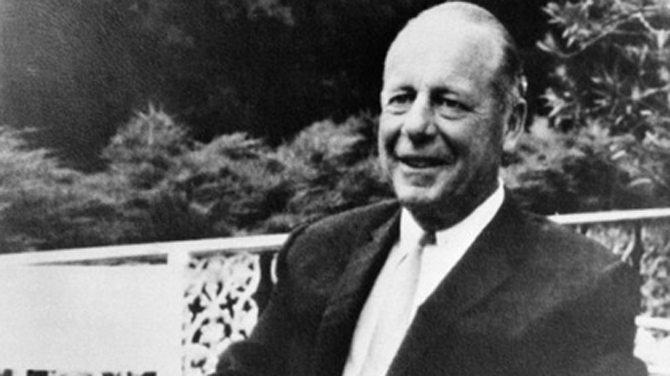CIA Past of Jim Thompson Revealed

BANGKOK — Forty-five years after vanishing into a jungle without a trace, "Silk King" Jim Thompson remains a daily presence in Thailand: Shoppers crowd his elegant stores and the American expatriate's antique-rich residence is one of the capital's top tourist attractions.
Credited with the revival of a now booming silk industry, Thompson attained legendary status, enhanced by a bon vivant lifestyle at a time when Thailand was still truly exotic—and by his mysterious death.
But little has been known about Thompson's intensely political, darker side—his freelance backing of Asia's insurgencies, clashes with Washington's Cold War warriors, and his connections to the US Central Intelligence Agency (CIA), which to this day reportedly refuses to release his complete file.
It's the cloak and dagger stuff, rather than the glitz and glamor, that's the focus of "The Ideal Man: The Tragedy of Jim Thompson and the American Way of War" by Joshua Kurlantzick, an author on Asian affairs with the New York-based Council on Foreign Relations.
The book provides no new clues about Thompson's vacation walk into a Malaysian jungle in 1967 from which he never returned. Numerous theories range from his having been eaten by a tiger to abduction by US intelligence agents.
But Kurlantzick says he uncovered a trove of other information from the Federal Bureau of Investigation, departments of Defense and State and other US government agencies through the Freedom of Information Act as well as unclassified material available, but mostly untapped, in the National Archives.
From this, emerges a portrait of Thompson as a US army officer in the Office of Strategic Services (OSS), forerunner of the CIA, who stood ardently behind America's immediate post-World War II policy of championing democracy and ridding the world of colonialism. He believed Vietnam's Ho Chi Minh was a nationalist who should be supported, and almost worshipped Pridi Banomyong, Thailand's pro-democracy statesman.
But Washington executed an about-turn and began to back assorted Asian strongmen and the French in colonial Indochina — "a scurvy race" he called them — on grounds that it was fighting the greater menace of Communism. Thompson became disillusioned and angry.
He was devastated when Pridi was ousted in a coup followed by the killings of many of his followers and a succession of thuggish leaders from the military, which remains a powerful force in Thai politics to this day.
"I wanted to use Jim to broaden the story to Thailand's relations with the United States, and to explore this whole generation of those who had come out of the OSS in World War II and then were pushed out by the Cold War," Kurlantzick said in an interview.
Scion of a wealthy East Coast establishment family, educated at Princeton University, James H. W. Thompson dabbled in architecture and partied in New York before volunteering for the army. A wartime marriage ended in divorce. Serving with distinction in North Africa and Europe, he was about to parachute into Thailand with an OSS team when the war ended.
In Thailand, Thompson became deeply involved with Lao, Cambodian and Vietnamese insurgents who used the country as a base in fighting the French, helping to supply weapons and serving as a go-between, often acting without approval from headquarters. Although discharged in 1946, Thompson continued to "serve as a de facto intelligence officer," Kurlantzick says, one useful to all sides until the radical shift in US policy when he and other colleagues in the OSS found themselves on the "wrong side."
"Jim was an idealist, a romantic, an anti-imperialist and there was no more idealistic time than just after the war," the book quotes a one-time US diplomat, Rolland Bushier, as saying.
America's secret entry into the war in Laos in the early 1960s finally destroyed his vision of "an America that used its power to build democracy in the region, that could distinguish between local grievances and global communism, and that inspired Asians as a liberator, not as a new colonizer."
Like a number of like-minded Americans at the time, Thompson was investigated by the FBI for suspected "un-American activities," and "although Thompson once had been extremely valuable to US intelligence, the agency finally put out a 'burn notice' on him, warning all employees to stay away from him," the book notes.
By this time, he had started The Thai Silk Company, reviving a largely moribund industry, helping thousands of poor villagers in the process and introducing Thai silk to the world.
1 | 2 next page »
- Rangoon on List for Big Weather Disasters
- More Than 100 Orangutans Lost in Indonesian Fires
- North Korea Rocket Could Cause Casualties: US
- Police Bust Asian Human Trafficking Ring
- Vietnam Revokes Visas of Church Officials
- Tibetan Sets Himself on Fire at Anti-China Protest
- Monkey Importer Faces Cruelty Charges Over Thai Shipment
- Authorities Postpone By-elections in Restive North
- Indian Rebels Release One of Two Italian Hostages
- India Lost $210 Billion on Coalfield Sales: Audit
